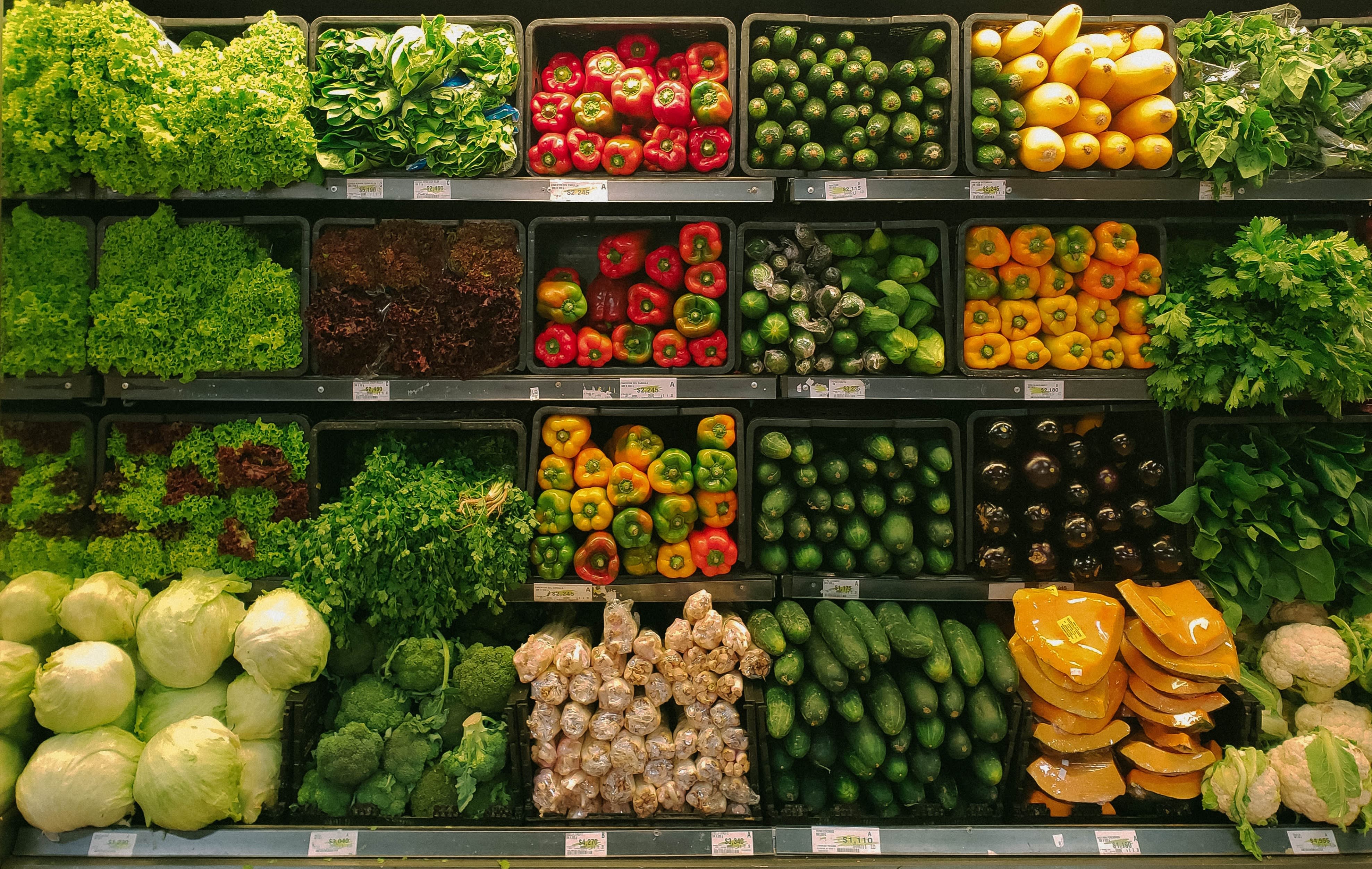German supermarkets: The ultimate guide for grocery shopping
Find the best and cheapest German supermarkets and learn tips for a better shopping experience.
Greta
When you move to Germany, one of the first tasks on your to-do list will likely be grocery shopping. It can feel overwhelming at first to grasp the local supermarkets, navigate through various food options, and hunt for the best deals. But fear not! In this guide, we'll provide you with everything you need to know about grocery shopping in Germany, including tips on finding the best and cheapest supermarkets.
Prices in German supermarkets
When living in Germany alone, you can plan your weekly budget for groceries to be around €50–€100. However, if you’re moving to Germany together with your family of 4, you can then expect to spend around €150–€300 per week. Below is an overview of average grocery prices in Germany.

Where do Germans buy their groceries?

Germans shop for groceries from a variety of stores, such as full-service supermarkets, discount supermarkets, organic supermarkets, farmer's markets, and online supermarkets. Let’s look at the best supermarkets in Germany based on shoppers' needs.
The cheapest supermarkets in Germany
Aldi, Lidl, Netto and Penny are highly regarded as the best discount stores in Germany, catering to budget-conscious shoppers. Whether you're looking for groceries, household items, or personal care products, these discount supermarkets offer a diverse range of items at wallet-friendly prices.
Best supermarkets in Germany
Edeka, Rewe, and Kaufland are some of the major supermarkets in Germany, providing a convenient one-stop shopping experience. These supermarkets offer an extensive selection of national and international brands, catering to shoppers who seek variety. You'll find a comprehensive assortment of groceries, including fresh produce, meat, dairy products, and household items on their shelves.
Organic supermarkets in Germany
While stores like Rewe or Aldi offer organic products, if you prefer dedicated organic supermarkets, Alnatura and Denn's BioMarkt are excellent choices. These renowned supermarkets specialize in organic and natural products, offering a wide selection of high-quality fruits, vegetables, meats, dairy products, and groceries.
Farmers’ markets in Germany
Germans deeply appreciate fresh food and often prefer to purchase it directly from vibrant farmers' markets. Here’re some of the most remarkable German markets, where you can discover plenty of enticing delights:
Viktualienmarkt (Munich): Located at Viktualienmarkt 3, this market offers a diverse selection of local products right in the heart of Munich.
Markthalle Neun (Berlin): Situated at Eisenbahnstrabe 42/43, this indoor market showcases a wide range of locally produced organic goods and tempting street food.
Wochenmarkt am Maybachufer (Berlin): Found at Maybachufer, this outdoor market boasts fresh produce and a multicultural food scene, perfect for exploring international flavors. Don't miss the handmade crafts available too.
Schillermarkt (Hamburg): Located at Schillerstrasse, this market offers an exciting shopping experience with fresh products, meats, cheeses, flowers, and delightful handmade crafts.
German online supermarkets
Germany's most popular online supermarkets include Amazon Fresh, REWE Online, Flink, Gorillas, and Bringmeister. You can explore various products through these platforms, ranging from fresh produce and pantry essentials to household items and specialty goods.
International supermarkets in Germany
In Germany, you'll find plenty of international supermarkets. Especially in large cities like Berlin, you’ll find a wide variety of international stores specialising in products from the Middle East, Asia, Africa, America and more. These stores are great for expats looking for products from their home countries.
Overview of the most popular supermarkets in Germany
| Name | Budget |
|---|---|
| Aldi | Low |
| Lidl | Low |
| Netto | Low |
| Penny | Low |
| REWE | Medium |
| Edeka | Medium |
| Kaufland | Medium |
| Real | Medium |
| Denn's Biomarkt | High |
| Alnatura | High |
Food boxes and meal kits in Germany
Germany offers several popular food box and meal kit providers that simplify cooking at home by delivering pre-portioned ingredients and easy-to-follow recipes. These services have become increasingly popular among locals seeking convenient and hassle-free meal solutions.
Here’re some well-known meal kit providers in Germany:
-
HelloFresh delivers weekly boxes containing fresh ingredients and step-by-step recipes for preparing delicious meals at home. They offer a wide range of meal options to accommodate different dietary preferences.
-
Marley Spoon offers meal kits with pre-portioned ingredients and chef-designed recipes, making home cooking a breeze. They prioritize the use of high-quality ingredients and provide flexible subscription plans.
-
Little Lunch: specializes in ready-to-eat soups and meals made from organic ingredients. Their products are convenient and perfect for quick and easy meals.
Food delivery apps in Germany

In Germany, you can enjoy the convenience of ordering delicious meals from various restaurants and having them delivered right to your doorstep through various food delivery apps. Here’re some well-known food delivery apps in Germany:
-
Lieferando (Takeaway.com) is one of Germany's leading food delivery apps. It offers many restaurants and cuisines, making it a go-to choice for ordering meals.
-
Uber Eats partners with local restaurants to deliver a variety of cuisines to customers' doorsteps.
-
Wolt focuses on providing a curated selection of restaurants and aims to offer a premium delivery experience.
-
Foodpanda has a wide selection of restaurant options, offering you a diverse range of cuisines.
How can you save money on groceries in Germany?
While it's true that the costs of food and drinks in Germany are generally affordable, finding ways to save even more is a wise approach. If you're interested in lowering your grocery expenses without sacrificing quality, consider these 5 helpful tips:
- Make a shopping list and stick to it. Before heading to the supermarket, create a list of the specific items you need and resist the temptation to buy unnecessary extras.
- Shop at discount stores. Germany is home to various discount stores like Lidl, Aldi, and Netto, which offer better prices than larger chains such as Rewe. While the selection may be more limited, you can still find essential products at reasonable prices.
- Follow discounts. Keep an eye out for discounts and promotions offered by supermarkets. Even the biggest chains have regular deals on certain items.
- Buy in bulk. Purchasing larger quantities of certain products, especially non-perishable items like canned food, can lead to significant cost savings. German stores often offer discounts or special deals specifically for bulk purchases.
- Check the clearance section. Some stores in Germany have a clearance section where you can find quality products at significantly reduced prices. These items might be approaching their expiry dates or have damaged packaging, but they are still perfectly usable.
Tips for grocery shopping in Germany
In Germany, shopping habits may differ from what you're used to, but with our tips, your grocery shopping experience will be stress-free.
Here’s what you should keep in mind when doing grocery shopping in Germany:
Bring your shopping bag. In German grocery stores, plastic bags are no longer provided for free to reduce plastic waste. If you forget your bag, you'll be charged for a plastic bag at the checkout.
Look for seasonal produce. By choosing fruits and vegetables that are in season, you can enhance the quality of your meals and save money in the process. It's a win-win!
Check the store hours. Germans prioritize their weekends, which means many stores have early closing times on Saturdays and remain closed on Sundays. Food stores typically operate from 8:00 AM to 8:00 PM. For extended hours, you can explore convenience shops (Spätkauf).
Consider shopping at farmers’ markets. Farmers’ markets are an excellent choice for affordable and fresh fruits and vegetables. They are held on a weekly basis in many German cities.
Have cash. Using cash is still very common in Germany, so you’ll see many street vendors and markets only accepting cash. Some larger stores may have a minimum amount for card payments or charge a fee for card transactions.
Use a coin to unlock a shopping cart. Shopping carts in Germany are not free. Instead, you'll find them locked together in a designated area near the store entrance. To unlock a shopping cart, simply insert a coin, usually €0.50 or €1, into a slot on the cart's handle. Once you're done shopping, return the cart to retrieve your coin.
Return your bottles to get money back. In Germany, the "Pfand" system adds a small deposit to bottles and cans when you buy drinks. Once you’re done, take them to a supermarket or beverage store and pop them into the special return machines. Each bottle gets you €0.15–€0.25 back. When you're done, the machine prints a receipt—use it to get cash or knock some euros off your shopping bill. Easy, right? Plus, it’s great for the planet!
Weight fresh produce yourself. You’ll find scales near the fresh produce section in many German grocery stores. You need to select the type of produce, weigh it using the scale, and print out a price label or sticker that indicates the weight and price of the item.
Learn some essential German phrases. Navigating Germany with just English can be quite challenging.
Wie viel kostet das? – How much does that cost? Kann ich mit Karte zahlen? – Can I pay with a card? Haben Sie das in einer anderen Größe? – Do you have this in a different size? Ist das im Angebot? – Is this on sale? Könnten Sie mir eine Tüte geben, bitte? – Could you give me a bag, please? Danke schön! – Thank you very much!
This article is for informational purposes only.
Please reach out to content @housinganywhere.com if you have any suggestions or questions about the content on this page. For legal advice or help with specific situations, we recommend you contact the appropriate authorities.
Related articles
In this article
Moving to Germany?
Find accommodation in cities across Germany. Book the place of your dreams from verified landlords even before relocating!
Start my Search

